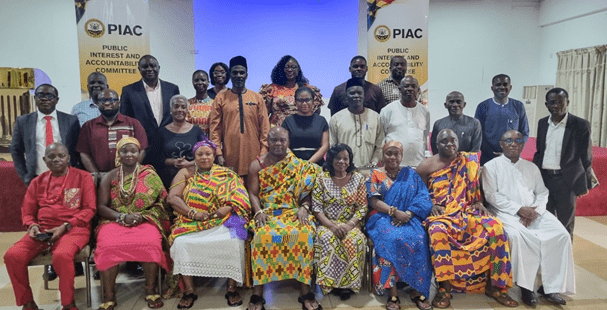By Kizito CUDJOE
Constituents of the Public Interest and Accountability Committee (PIAC) have urged the body to enhance its efforts at ensuring public accountability in use of the country’s petroleum revenues.
This call came during PIAC’s Annual General Assembly (AGA) in Accra, where representatives from its 13 constituent bodies highlighted the need for a stronger focus on accountability, not just transparency.
At the meeting, held on September 4, discussions centred on how PIAC and its constituents can work together on transitioning from transparency to tangible accountability in the management of petroleum revenues.
Many participants called for PIAC to intensify its advocacy, engage more effectively with the public and ensure that duty-bearers are held responsible for how oil and gas funds are used.
To this end, Chairperson-PIAC, Emerita Prof. Elizabeth Ardayfio-Schandorf said: “The Committee recognises the importance of collaboration with our constituent bodies to effectively disseminate our work to citizens”.
She stressed that informed citizens are crucial to demanding accountability, which is why PIAC remains committed to transparency and efficient revenue utilisation for the benefit of all.
Representatives from the 13 constituent bodies – ranging from civil society groups, trade unions and professional organisations to religious and traditional institutions – emphasised the importance of monitoring the Petroleum Revenue Management Act’s (PRMA) ongoing review.
They argued that PIAC should push for an enforcement mandate that would allow it to act on its recommendations and hold public officials accountable.
One common suggestion was for PIAC to step up its public education efforts. Constituents also urged the Committee to work more closely with media to improve dissemination of its reports and findings, ensuring that ordinary citizens understand how petroleum revenues are managed.
The AGA serves as a platform where PIAC can engage with its constituent bodies, update them on its activities and gather feedback on how to improve its operations. This year’s meeting placed significant focus on deepening collaboration between PIAC and its members, who represent a broad spectrum of Ghanaian society.
They comprise professional institutions, pressure groups, religious bodies and traditional groups. The institutions are independent policy research think-tanks, civil-society and community-based organisations, the trade union congress, national house of chiefs, association of queen mothers Association of Ghana Industries and the Ghana Chamber of Commerce and Industry.
The rest are Ghana Journalists Association (GJA), Ghana Bar Association (GBA), Institute of Chartered Accountants Ghana (ICAG), Ghana Extractive Industries Transparency Initiative (GHEITI), Christian groups, Muslim groups and Ghana Academy of Arts and Sciences.
The representatives expressed their desire for a more strategically empowered PIAC that can move beyond transparency and work toward a system wherein public officials are held accountable for proper use of oil and gas revenues.
During the meeting, Prof. Ardayfio-Schandorf also presented highlights from PIAC’s 2023 Annual Report, which showed a 6.78 percent decrease in crude oil production – marking the fourth consecutive year of decline.
The reduction was attributed to a lack of investment in discovering new fields and natural decline of existing ones.
She also outlined the Committee’s findings on petroleum receipts, allocations and distributions from the Petroleum Holding Fund (PHF), emphasising the need for reforms to sustain revenue flows.










